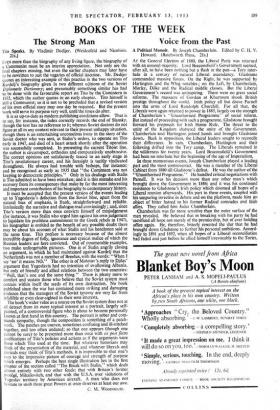BOOKS OF THE WEEK
21s.) Howard. (Batchworth Press. 21s.) Netherlands was not a member of Benelux, with the words: "When I The great new novel from Africa say no' it means NO." The other is of Molotov's reply to Djilas' argument that Yugoslavia had no intention of swallowing Albania, Blanket Boy's Moon but only of friendly and allied relations between, the two countries: "Well, that's one and the same thing." There is plenty more to comfort and sustain those who believe that the Soviet system must PETER LANHAM and-A. S. MOPELI-PAULUS contain within itself the seeds of its own destruction. No book (A Basuto chieftain) published since the war has contained more striking and damaging evidence that the managers of the Soviet tyranny are very far from A book of the greatest topical interest on the infallible or even clear-sighted in their own interests. African's place in his own country. Written The book's wider value as a source on the Soviet system does not at by.two South Africans, one white, one black.
all detract from its more topical interest as a portrait, largely self- painted, of a controversial figure who is about to become personally t Approaches " Cry, the. Beloved Country." known at first hand in this country. The portrait is sober and com- mands sympathy, though the composition is something of a patch- Wholly absorbing. -J. W. LAMBERT, SUNDAY TIMES work. The patches are uneven, sometimes confining and ill-stitched together, and too often undated; so that one appears (though one Completely absorbing — a compelling story.' cannot be sure)' to be presented more than once with ex post facto -STEPHEN SPENDER, LISTENER justifications of Tito's policies and actions as if the arguments were those which Tito used at the time. But whatever historians may 6 It made a great impression on me. I think it think of the presentation of the material, and whatever liberals and will do so on you, too. 9-NORMAN WALKER, D. SKETCH clericals may think of Tito's methods, it is impossible to shut one's eyes to the impressive picture of courage and strength of purpose Simple, serious, touching. In the end, deeply which emerges. Perhaps the best single illustration lies in the first chapter of the section called "The Break with Stalin," which deals almost entirely with two other feuds: that with Britain's former protége, Mihailovitch, and that with the U.S.A. over violations of Yugoslav territory by American aircraft. A man who does not hesitate to snub three great Powers at once deserves at least our awe.


































 Previous page
Previous page